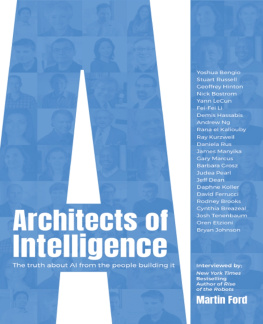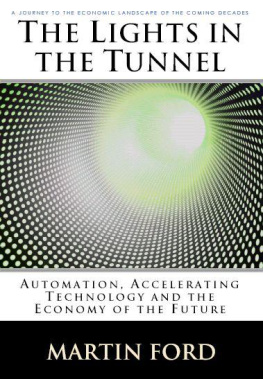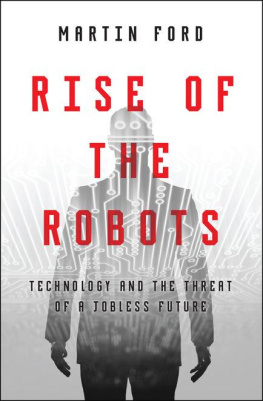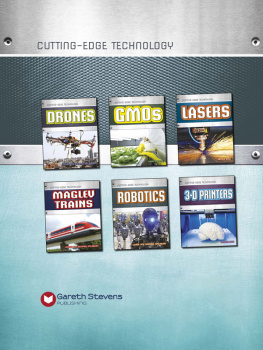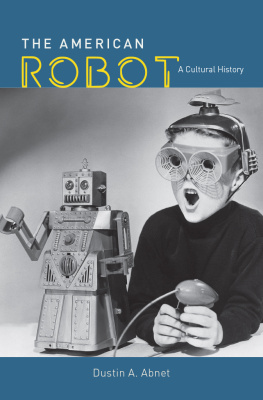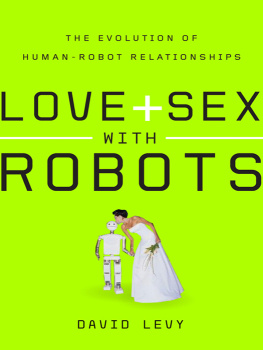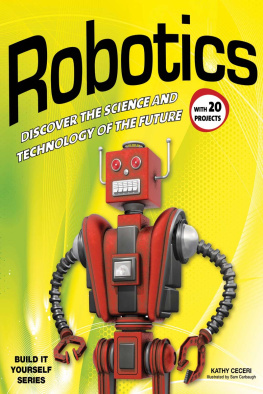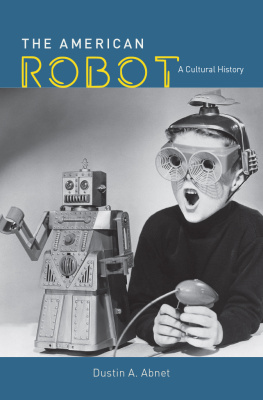A great many people contributed to my understanding of artificial intelligence through conversations and technology demonstrations over the past few years. Im especially grateful to the twenty-three prominent researchers and entrepreneurs who participated in the conversations recorded in Architects of Intelligence. They are truly among the brightest minds in the field of AI, and their insights and predictions informed much of the material in this book.
My editors, TJ Kelleher in the United States and Sarah Caro in the United Kingdom, were instrumental in helping me to refine my arguments and structure the manuscript into its optimal form. My agent, Don Fehr, once again found the proper home for this project at Basic Books.
The roughly eight months that I spent writing this book coincided with the emergence of the coronavirus pandemic and the ensuing shutdown. I was very fortunate to be able to remain safely at home and focus on my writing during this period, and I am profoundly grateful to all the health care professionals and frontline workers who had no such luxury.
Finally, I thank my wife, Xiaoxiao, and my daughter, Elaine, for their encouragement and support as I immersed myself in this project.
Copyright 2021 by Martin Ford
Cover design by Ann Kirchner
Cover image pzAxe / Shutterstock.com
Cover copyright 2021 by Hachette Book Group, Inc.
Hachette Book Group supports the right to free expression and the value of copyright. The purpose of copyright is to encourage writers and artists to produce the creative works that enrich our culture.
The scanning, uploading, and distribution of this book without permission is a theft of the authors intellectual property. If you would like permission to use material from the book (other than for review purposes), please contact permissions@hbgusa.com. Thank you for your support of the authors rights.
Basic Books
Hachette Book Group
1290 Avenue of the Americas, New York, NY 10104
www.basicbooks.com
Published by Basic Books, an imprint of Perseus Books, LLC, a subsidiary of Hachette Book Group, Inc. The Basic Books name and logo is a trademark of the Hachette Book Group.
The Hachette Speakers Bureau provides a wide range of authors for peaking events. To find out more, go to www.hachettespeakersbureau.com or call (866) 376-6591.
The publisher is not responsible for websites (or their content) that are not owned by the publisher.
Library of Congress Cataloging-in-Publication Data
Names: Ford, Martin (Martin R.) author.
Title: Rule of the robots: how artificial intelligence will transform everything / Martin Ford.
Description: New York: Basic Books, [2021] | Includes bibliographical references and index. |
Identifiers: LCCN 2021016340 | ISBN 9781541674738 (hardcover) | ISBN 9781541674721 (ebook)
Subjects: LCSH: Artificial intelligenceSocial aspects. | RoboticsSocial aspects.
Classification: LCC Q334.7 .F67 2021 | DDC 006.301dc23
LC record available at https://lccn.loc.gov/2021016340
ISBNs: 978-1-5416-7473-8 (hardcover); 978-1-5416-7472-1 (ebook)
E3-20210813-JV-NF-ORI
For my mother, Sheila
ON NOVEMBER 30, 2020, DEEPMIND, A LONDON-BASED ARTIFICIAL intelligence company owned by Google parent Alphabet, announced a stunning, and likely historic, breakthrough in computational biology, an innovation with the potential to genuinely transform science and medicine. The company had succeeded in using deep neural networks to predict how a protein molecule will fold into its final shape based on the genetic code from which the molecule is constructed in cells. It was a milestone that culminated a fifty-year scientific quest and marked the advent of a new technology that was poised to usher in an unprecedented understanding of the very fabric of lifeas well as a new age of medical and pharmaceutical innovation.
Protein molecules are long chains in which each link consists of one of twenty different amino acids. The genes encoded in DNA lay out the precise sequence, or essentially the recipe, of the amino acids that make up the protein molecule. This genetic recipe, however, does not specify the shape of the molecule, which is critical to its function. Instead, the shape results from the way the molecule automatically folds into a highly complex three-dimensional structure within milliseconds of its fabrication in the cell.
Predicting the exact configuration into which a protein molecule will fold is one of the most daunting challenges in science. The number of possible shapes is virtually infinite. Scientists have devoted entire careers to the problem, but have collectively achieved only modest success. DeepMinds system uses AI techniques that the company pioneered in the AlphaGo and AlphaZero systems that had famously triumphed over the worlds best human competitors at board games like Go and chess. But the era of AI being primarily associated with adeptness at games is clearly drawing to a close. AlphaFolds ability to predict the shape of protein molecules with an accuracy that rivals expensive and time-consuming laboratory measurement using techniques like X-ray crystallography offers irrefutable evidence that research at the very frontier of artificial intelligence has produced a practical and indispensable scientific tool with the potential to transform the world.
Arriving at a moment when nearly everyone on earth had likely encountered illustrations featuring the most notorious example of how a protein molecules three-dimensional shape defines its functionthe coronavirus spike protein, a kind of molecular docking mechanism that allows the virus to attach to and infect its hostthe breakthrough offered hope that we will be far better prepared for the next pandemic. One important use of the system might be to rapidly screen existing medications to find the ones likely to be most effective against a newly emergent virus, putting powerful treatments in the hands of doctors in the earliest stages of an outbreak. Beyond this, DeepMinds technology is poised to lead to a variety of advances, including the design of entirely new drugs and a better understanding of the ways in which proteins can misfoldsomething that has been associated with illnesses like diabetes as well as Alzheimers and Parkinsons diseases. The technology might someday be employed in a range of applications outside medicine, for example, to help engineer microbes that can secrete proteins capable of degrading waste such as plastic or oil. In other words, it is an innovation with the potential to accelerate progress in virtually every sphere of biochemical science and medicine.
Over roughly the past decade, the field of artificial intelligence has taken a revolutionary leap forward and is beginning to deliver an ever-increasing number of practical applications that are already transforming the world around us. The primary accelerant of this progress has been deep learninga machine learning technique based on the use of multilayered artificial neural networks of the kind employed by DeepMind. The basic principles of deep neural networks have been understood for decades, but recent dramatic advances have been enabled by the confluence of two relentless trends in information technology: First, the arrival of vastly more powerful computers has, for the first time, allowed neural networks to transition into truly capable tools. And, second, the enormous troves of data now being generated and collected across the information economy provide a resource crucial to training these networks to perform useful tasks. Indeed, the availability of data at a scale that would have once been unimaginable is arguably the single most important factor underlying the startling progress we have seen. Deep neural networks hoover up and leverage data much in the way that a massive blue whale feeds on tiny krill, scooping up vast numbers of individually insignificant organisms and then using their collective energy to animate a creature of magnificent size and power.


